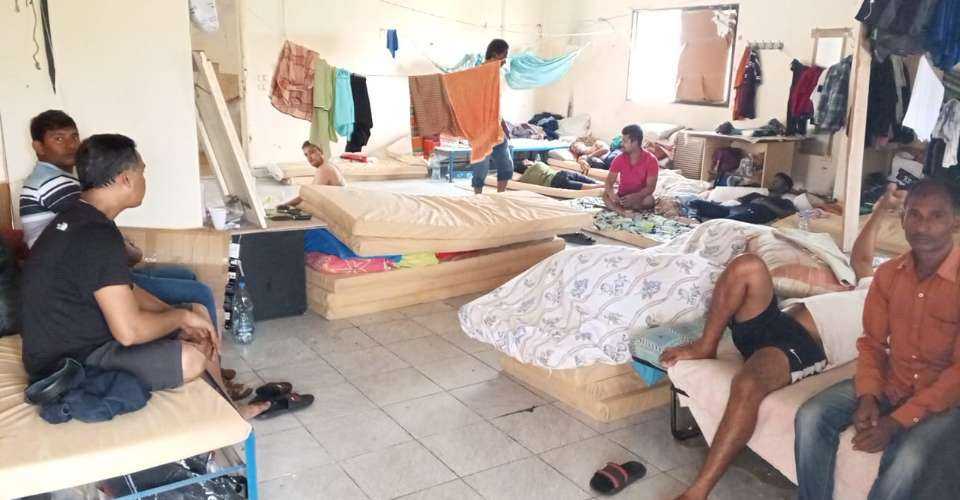Either war-hit Lebanon or strife-torn Bangladesh is the hard choice Safia Khatun has to make after a seven-year stay in the southern Lebanese city of Nabatieh.
The 23-year-old mother of two — the youngest of them aged a mere month old — has moved further north after Israel selected Nabatieh as its next target in mid-September in its war against non-state actor Hezbollah who wield considerable influence in the Mediterranean nation’s political sphere.
There were “rocket and bomb attacks” by the Israel Defense Forces (IDF) and “we fled Nabatieh,” said Khatun.
The IDF warned residents in the south to move northwards for safety in September.
Khatun used to eke out a living along with her husband in Nabatieh. The four-member expatriate family is currently housed in Sidon — Lebanon’s third-largest city situated on the Mediterranean coast between the southern city of Tyre and the capital Beiruit — along with other people from Bangladesh.
“It took us nearly eight hours to reach Sidon as the roads were jammed,” she said.
Bleak Future
Khatun does not know what is in store for the 250-member displaced community in Sidon as the Bangladesh government is yet to announce an evacuation plan for its nationals in the war-torn nation.
“We are in a dilemma,” Khatun said.
We do not know whether we will be repatriated or allowed to stay, she noted.
According to the Bangladeshi community, an estimated 3,000 Bangladeshis have been displaced since Israel increased attacks on Lebanon to dismantle hideouts of Hezbollah, which started attacking Israel amid the Gaza war started by Hamas in October last year.
Both Hamas and Hezbollah are Iran-backed non-state actors and play a major socio-political role in their respective regions.
According to the Lebanese health ministry, more than 1,400 people have been killed and 7,000 injured since Israel intensified its airstrikes against Hezbollah targets in mid-September.
At least seven Bangladeshi nationals have been hurt, but none killed, according to community members in Lebanon.
So far, the Bangladesh government has not made a call on airlifting its nationals. Currently, the nation is headed by a caretaker government, led by Nobel laureate Muhammad Yunus.
On Aug. 5, Prime Minister Sheikh Hasina fled the South Asian nation following a massive nationwide protest by students and youths.
However, an official from the foreign ministry said talks with other Bangladeshi missions in the Middle East were on to evacuate Bangladeshi nationals who are in trouble.
We have already allocated “funds for humanitarian aid” for the displaced Bangladeshi nationals in Lebanon and are “in touch with the International Organization for Migration,” he said.
There are at least 100,000 Bangladeshi migrant workers in Lebanon, according to media reports.
Most women like Khatun work as domestic hands and cleaners, and men like Rubel Hossain are employed at gasoline stations and in restaurants.
“I am worried about the future. The attacks seem to be intensifying,” 26-year-old Hossain said from Sidon.
He said many Lebanese people have closed their businesses and are leaving the country.
“If I cannot work here, I will have to return home. But what will I do next there?” Rubel asked UCA News on Oct. 7.
“I would urge the authorities to take steps to evacuate the Bangladeshis who are willing,” Shakirul Islam, chairman of Ovibashi Karmi Unnayan Program, a migrant rights body in Bangladesh, told UCA News.
Rising to the occasion
The Bangladeshi community in Lebanon has risen to the occasion by mobilizing funds and resources for fellow nationals in the shelter camp in Sidon — most of them jobless and some of them sick.
Saida-based Rabbol Sheikh arranged funds for the shelter center and the Bangladesh embassy provided food items. A few Lebanese people also extended support.
The embassy in the capital Beirut has been shifted temporarily to a safer place.
“It is challenging to arrange food for 250 people on a daily basis. There are women and children with special needs,” Sheikh said.
“We are grateful to our Bangladeshi community,” Khatun said.
Sheikh said some of the displaced Bangladeshis prefer to go back, but then there are others who want to wait as they spent a lot of money to reach Lebanon.
They see the good old days returning to the land of cedars once the war is called off by the Israeli army.
But their current stay in what was once the only Christian-majority nation in the Middle East is plagued with shortages of essential items. “The babies need baby food, which I am not “in a position to buy,” Khatun said.
source : ucanews

